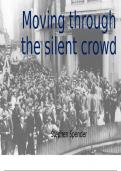Moving through
the silent crowd
Stephen Spender
,About the Poet : Stephen
Spender
• Sir Stephen Harold Spender was born on 28 February 1909 in Kensington, England
and passed away on 16 October 1995.
• He is best known for his poetry dealing with social injustices and class
discrimination. As an English poet and critic, his reputation was built in the 1930’s.
• Spender was educated at University College School, London, and at University
College, Oxford where he met the poets W.H. Auden and C. Day-Lewis.
• During 1930–33 he spent many months in Germany with the writer Christopher
Isherwood.
• Spender’s poems were self-critical, yet compassionate. Spender became
increasingly more autobiographical, writing about his honest, personal experiences
as can be seen from the first volume Ruins and Visions in 1942, to Dolphins
published in 1994.
• From the 1940s Spender was well known for his perceptive criticism than he was as
a poet. Spender’s prose works include short stories (The Burning Cactus,1936), a
novel (The Backward Son, 1940), literary criticism, and autobiography(World Within
World, 1951.
• During World War II Spender joined the National Fire Service (1941–44). After the
war he visited the United States often, teaching and lecturing at universities.
• In 1970 he was appointed professor of English at University College, London; he
became professor emeritus in 1977 when he retired.
• Spender was knighted in 1983 for his contribution to English Literature.
, • Note 1
The Great Depression of the Thirties began with
Wall Street Crash in 1929 and affected much of
world. In the UK it was particularly bad because
country relied heavily on its exports which dried
many jobs were lost, particularly in mines and
factories. Moreover, Britain was still recovering
the effects of WW1. It was an economically, and
Backgroun socially, very difficult time.
• Note 2
d The social concept of class was deeply entrench
the UK. The rich elite ‘upper classes’ had family
property and wealth and they ran everything. T
‘lower classes’ in various ranks worked for them
factories, on their estates and so on. By the twe
century the stratification of society had become
fluid but there was still a definite class division.
Education was the key, and the poor did not eas
access to the opportunities given to the wealthy
© Macrat Pub
, The Title
Adjective: silent
not making or accompanied by
adjective: moving sound.
Means to be in
motion. Noun: crowd
a large number of people gathe
together.
Moving through the silent crow
Preposition: through The is a determiner.
moving in one side Specific to the crowd
and out of the other he is moving
side of (an opening, through.
channel, or location).
, Moving through the silent crowd
Who stand behind dull cigarettes
These men who idle in the road,
I have the sense of falling light.
They lounge at corners of the street
And greet friends with a shrug of shoulder
And turn their empty pockets out,
The cynical gestures of the poor.
The Poem Now they’ve no work like better men
Who sit at desks and take much pay
They sleep long nights and rise at ten
To watch the hours that drain away.
I’m jealous of the weeping hours
They stare through with such hungry eyes
I’m haunted by these images,
I’m haunted by their emptiness.
,Analysis
per stanza
, Stanza 1
The title is repeated in line 1, which stresses the separation between the speaker and the "crowd" and appears to be an oxymoron or contradicti
is "moving" through the "crowd" that is idling around on the street "silent[ly]". The speaker is by themself and not a member of the group. Mor
outsider and does not identify with the group of the unemployed men.
The "silent" "crowd" is described, which heightens the Lines 2-3 emphasis on the "dull
dramatic tension. To characterise a gathering of people as the individuals are standing beh
silent seems inappropriate. Since crowds are often raucous rise to an odd impression
and noisy, this defies our expectations and produces an Moving through the silent crowd
unnerving atmosphere.
inappropriate to use the te
This description piques the reader's interest as we consider if characterise something that is b
the crowd's objectives are peaceful, frightening, or dismal. A it seems to be characterising the
peaceful, cheerful, or excited gathering would most likely be rather than as motivated, drive
boisterous.
Who stand behind dull cigarettes The men's description as "idle" i
have been there for a while an
Lines 1-3: The "crowd" is remarkably "silent," lending the hurried, unlike when people
atmosphere/mood an air of hopelessness and foreboding. arriving to work or other events
They have nothing to say to one another, yet for some reason, appears that the speaker is accu
their stillness seems ominous rather than serene. The
description of the men's "dull cigarettes" adds to the overall These men who idle in the road, being lethargic.
air of indifference. This focuses on the dreary sentiments of
the audience instead of the smokes. The word "idle" also Line 4: The speaker shifts the focus from the desc
suggests that the men are not actively seeking work and are describing his feelings as he moves through the cr
not acting with any intention. They go to the streets in search the ] light" could literally mean that it is at the end
of companions who experience similar circumstances. I have the sense of falling light. sky is darkening or metaphorically, the speaker co
"sense" of dread and hopelessness. He might also
the men's sense of helplessness and disillusionme
situation. This imagery also enhances the mood w
depressing and ominous.




